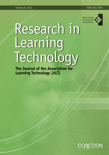
Research in Learning Technology
Scope & Guideline
Unlocking the Potential of Technology in Education
Introduction
Aims and Scopes
- Integration of Technology in Learning:
The journal explores how various technologies, such as VR, AR, and mobile learning tools, are integrated into educational practices and their impact on student learning outcomes. - Assessment and Evaluation in Digital Contexts:
Research on the effectiveness of assessment methods, including online assessments and feedback mechanisms, is a key focus area, emphasizing how technology can improve evaluation processes. - Student and Educator Perspectives:
The journal publishes studies that capture the perspectives and experiences of both students and educators regarding the use of technology in learning environments. - Open Educational Resources (OER):
There is a consistent emphasis on the development, implementation, and impact of Open Educational Resources, highlighting their role in promoting accessible education. - Pedagogical Innovations:
The journal investigates innovative pedagogical approaches, such as flipped classrooms and blended learning, especially how they leverage technology to enhance engagement and learning. - Digital Competence and Teacher Training:
Research related to educators' digital competencies and professional development in using educational technologies is a significant theme, focusing on preparing teachers for modern classrooms.
Trending and Emerging
- Virtual and Augmented Reality in Education:
There is a growing interest in the use of VR and AR technologies to enhance learning experiences, particularly in fields such as science education and special needs education. - Online Learning and Student Engagement:
Research focusing on strategies to improve student engagement in online learning environments has become a prominent theme, reflecting ongoing developments in digital education. - Impact of COVID-19 on Learning Technologies:
The pandemic has catalyzed research into emergency remote teaching and the effectiveness of various digital tools, highlighting adaptive practices and lessons learned. - Social Media and Learning Communities:
Emerging studies are exploring how social media platforms facilitate learning and collaboration among students and educators, indicating a trend towards informal learning environments. - Technostress and Educator Well-being:
There is an increasing focus on the psychological impacts of technology use among educators, particularly regarding technostress, and its implications for teacher satisfaction and effectiveness.
Declining or Waning
- Traditional Teaching Methods:
There has been a noticeable reduction in research centered around conventional pedagogical approaches, as the journal shifts towards more technologically integrated methodologies. - General ICT Applications:
Studies focusing broadly on ICT applications without a specific educational context are becoming less frequent, indicating a move towards more targeted research that links technology directly to learning outcomes. - Physical Learning Environments:
Research that emphasizes physical classroom settings without considering digital enhancements or hybrid models is diminishing, as the emphasis on blended and online learning environments grows. - Non-Digital Assessment Methods:
There is a decline in studies that discuss traditional assessment techniques that do not incorporate or explore digital tools, reflecting a transition towards digital assessment strategies. - One-size-fits-all Learning Approaches:
The journal increasingly favors research that addresses differentiated and personalized learning experiences, leading to a decline in studies proposing uniform teaching methods.
Similar Journals
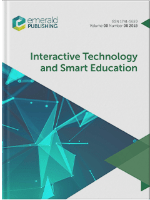
Interactive Technology and Smart Education
Exploring the synergy of technology and education for a smarter tomorrow.Interactive Technology and Smart Education is a leading academic journal published by EMERALD GROUP PUBLISHING LTD, dedicated to exploring the dynamic intersection of technology and education. With a robust impact factor signifying its significant contributions to the field, this journal consistently ranks in the Q1 quartile in categories such as Computer Science (Miscellaneous), Education, and E-learning, reflecting its prestige and wide-ranging influence. A staple for researchers, educators, and industry professionals, the journal addresses innovative practices and developments in interactive technologies that enhance teaching and learning experiences. Operating from its base in the United Kingdom, the journal spans nearly two decades of impactful publishing, featuring high-quality research that plays a crucial role in shaping the future of education through technology. Scholars seeking to stay at the forefront of this evolving field are encouraged to contribute and engage with the journal's pioneering work.

International Journal of Technology in Education
Advancing Educational Practices with Cutting-Edge ResearchThe International Journal of Technology in Education, published by the International Society for Technology Education & Science (ISTES), serves as a vital platform for researchers, educators, and practitioners devoted to the intersection of technology and educational practices. With an E-ISSN of 2689-2758, this journal aims to showcase innovative research, case studies, and theoretical contributions that explore how emerging technologies can enhance teaching and learning. Although specific metrics like impact factor and HIndex are currently unavailable, the journal is committed to rigorous peer review and high academic standards, ensuring that all published work contributes meaningfully to the evolving landscape of educational technology. As an open-access journal, it strives to make research widely available, fostering collaboration and knowledge sharing among its audience. Whether you are a researcher exploring new horizons or a professional seeking practical applications of technology in education, the International Journal of Technology in Education is an indispensable resource.

Online Learning
Unlocking the Potential of Digital EducationOnline Learning is a premier, open-access journal dedicated to advancing research and practice in the field of online education. Published by the ONLINE LEARNING CONSORTIUM, the journal has been a critical resource since its inception in 2014, bringing together innovative studies and discussions that shape the future of digital learning environments. With its impact factor significantly acknowledged in the field, Online Learning proudly holds a Q1 ranking in both Computer Networks and Communications and Education categories, highlighting its influential impact within the academic community. Its rankings in Scopus also underscore the journal's commitment to quality research, featured in the 92nd percentile in Social Sciences and 79th percentile in Computer Science. Researchers, educators, and professionals benefit from a rich array of open-access articles that address current trends, methodologies, and case studies in online learning, making it an essential platform for knowledge exchange. With a focus on fostering collaboration and innovation, Online Learning serves as a vital resource for those looking to explore transformational educational practices in an increasingly digital world.
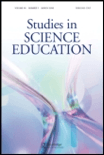
Studies in Science Education
Leading the Charge in Science Education ExcellenceStudies in Science Education is a prestigious journal published by ROUTLEDGE JOURNALS, TAYLOR & FRANCIS LTD, renowned for its commitment to advancing the field of science education. With an impressive impact factor, and categorized in the Q1 quartile within the Education domain, this journal ranks among the top in the field, currently holding the 16th position out of 1543 social science education journals, placing it in the 98th percentile according to Scopus rankings. Since its inception in 1974, it has provided a rigorous platform for researchers, practitioners, and educators to explore, debate, and disseminate significant findings relevant to science education. Although the journal does not offer open access options, it ensures high visibility through its well-curated content, including empirical studies, theoretical discussions, and innovative practices aimed at enhancing educational outcomes in science. By continuously engaging with contemporary educational challenges, Studies in Science Education serves as an essential resource for those dedicated to improving science teaching and learning worldwide.

ETR&D-EDUCATIONAL TECHNOLOGY RESEARCH AND DEVELOPMENT
Pioneering Research for Tomorrow's Learning EnvironmentsETR&D - Educational Technology Research and Development, published by Springer, is a premier journal dedicated to advancing the field of educational technology through rigorous research and development. With a history dating back to 1957, it has established itself as a leading resource for scholars and practitioners, maintaining a remarkable Q1 ranking in Education as of 2023, and standing at an impressive 41st out of 1543 in the Scopus rankings for Social Sciences - Education, placing it in the 97th percentile. This journal aims to bridge the gap between theory and practice, offering in-depth insights into the latest innovations and methodologies in educational technology. As a vital resource for researchers, educators, and technology developers, ETR&D highlights the interplay of technology, pedagogy, and learning environments, driving the evolution of educational practices in a digital era. Although not an open access journal, it provides comprehensive access options for institutional and individual subscribers, ensuring that key findings reach a broad audience. Discover the future of education through ETR&D's influential publications.
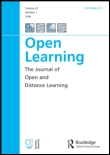
Open Learning
Exploring the Future of Education TogetherOpen Learning, published by Routledge Journals, Taylor & Francis Ltd, is a leading peer-reviewed journal in the field of education and e-learning, showcasing innovative research and practice since its inception in 1970. With a robust impact factor and consistently ranked in the Q1 category for both education and e-learning by Scopus, this esteemed journal positions itself at the forefront of academic dialogue, exploring the evolving landscape of digital and open learning environments. The journal's authoritative content and empirical studies serve as essential resources for researchers, educators, and students striving to enhance pedagogical strategies and educational outcomes in a rapidly changing technological world. Published quarterly, Open Learning remains committed to cultivating scholarly exchange and advancing knowledge within the global education community.

Technology Pedagogy and Education
Navigating the Evolving Landscape of Educational TechnologyTechnology Pedagogy and Education, published by Routledge Journals, Taylor & Francis Ltd, is a leading academic journal focused on the intersection of technology and educational practices. With an impact factor reflecting its significant contribution to the field, this journal provides a critical platform for disseminating innovative research and emerging trends in technology-enhanced learning. Serving as a resourceful hub since its inception in 2003, it has established itself in the top quartile of various categories, including Communication, Computer Science Applications, Education, and Information Systems. Researchers and educators alike will find the journal's insights invaluable as they navigate the ever-evolving landscape of educational technology. Although it does not currently offer open access options, its rigorous peer-review process ensures that only the highest quality research is published, making it essential reading for anyone invested in the educational sector.
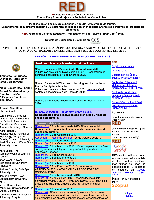
RED-Revista de Educacion a Distancia
Empowering Educators with Cutting-Edge InsightsRED-Revista de Educacion a Distancia is a premier open-access journal published by UNIV MURCIA in Spain, dedicated to advancing research in the fields of education and computer science applications. Since its inception in 2001, the journal has served as an essential platform for disseminating innovative research and practical applications of distance education methodologies. With an impressive impact factor and ranked in Q2 across both Computer Science Applications and Education categories as of 2023, RED is recognized for its significant contribution to the scholarly community, particularly within the Social Sciences and Engineering domains. Researchers and professionals are invited to explore cutting-edge studies that underpin pedagogical effectiveness and technological integration in educational settings. Based at the Edificio Pleiades Campus de Espinardo in Murcia, RED continues to foster an engaging dialogue among academics, providing insights that propel the field forward.

Innoeduca-International Journal of Technology and Educational Innovation
Unlocking Potential: Innovative Practices for Modern LearningInnoeduca - International Journal of Technology and Educational Innovation, published by the esteemed Universidad de Málaga, stands at the forefront of the rapidly evolving intersection of technology and education. With an E-ISSN of 2444-2925, this open-access journal has proudly disseminated cutting-edge research and innovative practices in educational technology since 2015. It aims to empower researchers, educators, and policymakers by providing a platform for sharing knowledge, insights, and advancements that enhance the learning experience through technology. The journal covers a wide array of topics, including digital learning environments, instructional design, and the impact of emerging technologies on education. By offering free access to its articles, Innoeduca fosters a global dialogue among professionals and students alike, making a significant contribution to the field of education innovation and technology.

Studies in Educational Evaluation
Unveiling transformative research in educational evaluation.Studies in Educational Evaluation is a premier journal published by Elsevier, specializing in the critical evaluation of educational practices and policies. Established in 1975, this esteemed journal serves as a vital resource for researchers and practitioners engaged in the ever-evolving field of education. With its impressive Q1 ranking in the Education category and positioned at the 90th percentile among its peers in Scopus rankings, it reflects a high standard of scholarly excellence. The journal aims to disseminate innovative research that fosters deeper understanding and effective assessment frameworks within educational contexts, making it indispensable for educators, policymakers, and researchers alike. Although it currently does not offer open access, the insights found within its pages are crucial for driving improvements in educational evaluation methodologies globally. Located in the United Kingdom, and available for wide readership, Studies in Educational Evaluation is committed to pushing the boundaries of knowledge in education assessment through rigorous, peer-reviewed scholarship.